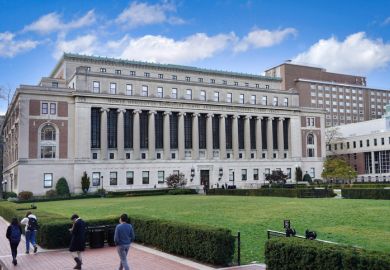Scientists are working to uncover the secrets of the universe, as opposed to peddling an outdated worldview from behind a fake name
Last week, the scientific community held its collective breath when the BICEP2 Collaboration announced the first evidence of events moments after the Big Bang which, if confirmed, offer insights into the origin of the universe and everything in it.
This was an amazing moment that comes along maybe once a generation. Maggie Aderin-Pocock, the space scientist and renowned science communicator, and I were invited on to the BBC’s Newsnight to convey the wonder of this discovery to a broad audience.
Not everyone saw the wonder: a columnist hiding behind a pseudonym in the Daily Mail alleged “Newsnight’s Guardian-trained editor, Ian Katz, is keen on diversity. So, two women were invited to comment on the report about (white, male) American scientists who’ve detected the origins of the universe – giggling Sky at Night presenter Maggie Aderin-Pocock and Sri Lanka-born astronomer Hiranya Peiris.”
Maggie and I are both women with dark skin. If this is worthy of mention at all, it should be to celebrate that individuals in modern British society are achieving their potential, regardless of their appearance or heritage. Likewise, the BICEP2 team is composed of men and women of multiple ethnicities from around the world, all with hard-earned expertise. These scientists are working together to uncover the secrets of the universe, as opposed to peddling an impoverished and outdated worldview from behind a fake name.
The blatant untruths displayed in the Mail piece are damaging to the public perception of science and scientists. They discourage women and people from different backgrounds from studying and engaging with science. Given the support across the political spectrum and at the highest levels of government for getting more young people interested in science, technology, engineering and mathematics subjects, it is remarkable how a few moronic sentences in a daily newspaper with wide circulation can reinforce incorrect stereotypes; that science is a “white, male” occupation and that people who look like me are not qualified to have a voice.
A few years ago, I watched the excellent BBC series State of Play, which followed the efforts of a small group of journalists to uncover a massive conspiracy between the government and an oil company. I realised that the journalists were, at heart, engaged in research: they could go to print only when they had the evidence to back up their sensational claims. In some sense, I was watching people investigate a problem using the same principles that underpin scientific research.
Let us apply basic journalistic skills to the piece in the Mail: a quick Google search instantly reveals my scientific credentials, Maggie’s qualifications and expertise, and the fact that the BICEP2 team is a diverse group of men and women of multiple nationalities. The inevitable conclusion is that this author cherry-picked the available information to ignore abundant evidence against his small-minded agenda.
One good thing to come out of the whole affair was University College London’s response, which made me incredibly proud to be part of this institution. Maggie and I received instant, robust and public institutional support from David Price, UCL’s vice-provost for research. Our scientific colleagues also sprang into action, with a compelling statement of support from the Royal Astronomical Society and its president, David Southwood. Their actions, widely congratulated on social media, set an excellent example for other institutions to take a public, hard stance against any derogatory comments of this kind made about their academics.
The real story here is not who happened to end up on Newsnight last week, but that we are all members of a species who can join together to attempt the grand challenge of understanding the universe we live in and, by extension, ourselves. And while it might be a small group of scientists leading this endeavour, they represent all humanity. As the Nobel prizewinning – and “Pakistan-born” – physicist Abdus Salam said: “Scientific thought is the common heritage of mankind.”
Register to continue
Why register?
- Registration is free and only takes a moment
- Once registered, you can read 3 articles a month
- Sign up for our newsletter
Subscribe
Or subscribe for unlimited access to:
- Unlimited access to news, views, insights & reviews
- Digital editions
- Digital access to THE’s university and college rankings analysis
Already registered or a current subscriber? Login





